Here are my picks for the best spy novels of 2015. Some of these thrillers may make the bestseller lists, and others may prove to have a narrower reader appeal. Please note that I’m partial to historical fiction about espionage that has a literary flair; the novels I’ve selected reflect that bias.
(Click for my list of 2014’s top spy thrillers and 2013’s top spy thrillers ).
Leaving Berlin by Joseph Kanon – TOP SPY NOVEL OF 2015
Leaving Berlin may be the most suspenseful of Joseph Kanon’s historical spy thrillers, a beautifully-crafted and evocative novel set in the ruins of 1949 East Berlin. Kanon’s The Good German took place a few years earlier, in 1945 Berlin, and he has an affinity for the city and its culture (just as novelist Alan Furst does for Paris between the wars.)
The novel’s protagonist is Alex Meier, a German-Jewish author who has spent the Second World War in Hollywood but has now run afoul of Congressional investigators who want him to “name names,” which as a matter of principle he won’t. No longer welcome in America, Meier finds himself warmly welcomed by the Soviet authorities ruling Berlin. But Meier has struck a secret, Faustian bargain with the CIA—in exchange for his eventual readmission to the U.S., where his twelve-year old son lives, he will spy on the Russians and their German Stalinist helpers.
Meier is not the only literary exile returning to post-war Berlin; Kanon includes two real-life figures—Bertolt Brecht, the German Marxist poet and playwright, and the anti-Fascist writer Anna Seghers (the pseudonym adopted by Anna Reiling)—who have also decided to live under Communism in the hopes of building a new society, a Workers’ Paradise.
Meier finds a city full of contrasts. Berliners can still travel between the Soviet, American, French, and British sectors. At the same time, however, the Soviets are trying to force the Allies to leave by cutting off access to the food and coal necessary for the city’s very existence. The West has responded with the Berlin Airlift, and the sight and sound of airplanes flying overhead is a constant reminder in Leaving Berlin of a growing Cold War tension that Meier can’t escape.
The novel explores the moral and psychological costs of betrayal. The CIA expects Meier to spy on his German friends from the past, including the beautiful aristocrat Irene von Bernuth, once his lover; the German secret police (the K-5, later known as the Stasi) are recruiting informants; and the Russians are setting the stage for a purge of Party members who suddenly find themselves labeled as counter-revolutionaries because they’ve made the wrong joke.
Kanon has fashioned a suspenseful and engaging story against this backdrop. As Dieter, a former Berlin cop now working for the Americans, and one of the more appealing characters in the book, explains to Meier “in this business at some point you have to trust somebody.” Who Meier can trust—and how the personal can trump the political—becomes the fascinating question at the heart of Leaving Berlin, and one that commands the reader’s attention until the very last page.
One Man’s Flag by David Downing
It’s 1915 and British intelligence agent Jack McColl is back, defending the far-flung Empire as the First World War rages in Europe. David Downing introduced McColl in Jack of Spies and he’s a likeable character, an English patriot who also sympathizes with the Indian and Irish nationalists chafing under imperial rule.
Jack has been tasked with disrupting plots against His Majesty’s control of British colonies, and that puts him in tight spots from Darjeeling to Dublin. At the same time, One Man’s Flag follows the travels of the feminist American journalist Caitlin Hanley—McColl’s estranged love interest—who chronicles the brutal war on the Western front.
One Man’s Flag is an engaging read, chock full of adventure and history. The British Empire held together until after the Second World War, when demands for independence and self-determination by its colonies could no longer be denied. Until then, the Foreign Service and intelligence agencies of the Crown fought a holding action, and Downing’s Jack McColl novels should offer an intriguing short course on this somewhat ignored history.
The Mulberry Bush by Charles McCarry
The desire for revenge—for payback against those who have wronged us—taps into deep evolutionary impulses. We must punish offenders to deter others who might be tempted to wrong us. Harsh, public reprisals discourage future offenses, or to cast revenge in a more positive light, it acts to encourager les autres into better behavior.
Charles McCarry’s latest, The Mulberry Bush, is an intriguing novel that employs the spy thriller genre to explore the theme of revenge. McCarry, a former CIA field operative, is best known for The Tears of Autumn, which offers an inventive conspiracy theory about the Kennedy assassination, and the political intrigue Shelley’s Heart, which John J. Miller of the National Review has endorsed as one of ten great conservative political novels.
The plot in The Mulberry Bush is quite simple: the son of a disgraced American intelligence officer becomes a spy himself in the hopes of damaging the institution he believes has ruined his father’s life. The novel is told from the first person perspective, and the protagonist—never identified by name—becomes a skilled field agent as he climbs the career ladder within the agency (called only Headquarters in the book) preparing for a day of reckoning. He meets and falls in love with a beautiful Argentinian woman, Luz, whose parents are revolutionaries, casualties of the Dirty War waged by the Argentine military government in the 1970s. She also wants retribution for the loss of her father and mother, and she blames the Americans for their support of the junta’s torturers. Together, they weave an intricate plot against Headquarters involving Latin terrorists and Russian spies. They have not accounted for the Law of Unintended Consequences, however, and events quickly spiral out of control.
Much of The Mulberry Bush is beautifully written and artfully plotted, leavened with bits of sly humor. McCarry is particularly biting when he writes about the willingness of radical elites to sacrifice their working class foot soldiers. The novel also some interesting things to say about love and betrayal.
In the end, however, The Mulberry Bush suffers from an identity crisis of sorts: it’s not quite realistic espionage fiction, nor is it a full-throttle conspiracy-driven thriller. McCarry asks the reader to suspend disbelief once too often. Russia’s FSB (the successor to the KGB) is portrayed as a modern-day SMERSH (of James Bond fame) with tentacles everywhere. The quasi-Maoist Latin American terrorist network in the book is pure fantasy. For my money, the thriller elements don’t add anything to the novel, and detract from McCarry’s intelligent consideration of the psychic costs of getting even.
The English Spy by Daniel Silva
In the past, I haven’t included any of Daniel Silva’s Gabriel Allon novels in my top spy thrillers lists. While his books are well-written and carefully researched, I’ve found Silva’s penchant for over-the-top plot twists and casual violence somewhat off-putting. But on the 2015 list I’m including The English Spy, the fifteenth in the Allon series, because of how Silva paints a disturbingly accurate picture of current Russian and Iranian intentions. As Silva noted in a recent “Meet the Press” interview, his very negative portrayal of Vladimir Putin’s regime in Moscow Rules (2008) has proven to be spot on; it appears that his depiction of the Russian-Iranian intelligence collaboration in The English Spy is playing out in the Mideast today.
In The English Spy Israeli super-agent Gabriel Allon teams up with a former SAS operative in hunting down a veteran IRA bomber who has murdered a member of the British royal family. As the story unfolds, Allon learns that the Russian FSB may be involved, and that there are more targets for bombing in the United Kingdom.
What’s different about The English Spy is how Silva’s novel directly criticizes the Obama Administration’s handling of Russia and Iran. In media appearances, Silva has been skeptical about the Iran nuclear deal and its lack of “anytime, anywhere” inspections. It’s a sad commentary that this former journalist and thriller writer has a better understanding of current foreign policy realities than does the State Department and White House.
The Lady from Zagreb by Philip Kerr
Philip Kerr says it was the encouragement of Ivan Held, president of G. P. Putnam’s Sons, that caused him to write yet another Bernie Gunther novel, even though Kerr wondered whether the character was played out after nine books. Held was proved correct by The Lady from Zagreb. There’s nothing tired or overly derivative about the novel, which features former Berlin homicide detective Gunther caught up in the dangerous internal politics of a Nazi Germany gone mad.
In his latest adventure, Gunther must dance to the tune of the notorious Joseph Goebbels, the German Minister of Propaganda, who has become besotted with a mysterious Croatian actress named Darla Dresner. Goebbels tasks Gunther with persuading Dresner to star in a Nazi propaganda film, a job that takes him from Berlin to the killing fields of Croatia and then to the placid streets of Zurich.
In Switzerland Bernie tangles with Gestapo thugs and OSS agents controlled by Allen Dulles (the future CIA chief) while falling heads-over-hells for the glamorous movie star, who has a few secrets of her own. Gunther must find a way to protect a woman he now loves without signing his own death warrant, a challenge he (not surprisingly) proves capable of meeting.
It’s hard to categorize Kerr’s novels. While they often employ traditional crime story elements (an unsolved murder or two) and feature a former cop, they also involve a fair amount of political intrigue and, at times, conventional espionage. At the same time, Kerr is interested in the compromises his subversive Everyman, Bernie Gunther, must make to stay alive and in what he can salvage of decency and love in a world seemingly without morality.
The Swimmer by Joakim Zander
The English translation of Joakim Zander’s The Swimmer arrives with considerable advance praise: author Joseph Finder lauds it as “comparable to the best of Le Carré,” and Kirkus Reviews calls it a “compulsively readable page-turner with unexpected heart.”
There’s no question that Zander, a Swedish author and lawyer, has carefully read Stieg Larsson’s Millenium trilogy ( The Girl with the Dragon Tattoo, etc.) and many of Larsson’s elements turn up in The Swimmer: a female punk hacker, corrupt lawyers, sinister conspiracies, Sweden in the winter, and even a sly meta-reference to Lisbeth Salander. A blurb on the novels’s inside book flap trumpets “Homeland meets Stieg Larsson.”
While an engaging beach or airport read, The Swimmer doesn’t live up to the literary hype—it’s more Dan Brown than John Le Carré. Zander understands how to keep a thriller moving, and he successfully borrows Brown’s technique of brief chapters ending with an unresolved conflict or crisis. Yet the novel is driven by an implausible plot (daylight gun battles in Brussels and Paris?) and a lazy Euro-left stance toward Islamic jihadism that—after the Charlie Hebdo attack and the rise of ISIS—is completely out of touch with current reality.
Zander’s novel focuses on American misdeeds in the War on Terror, echoing some of le Carré’s concerns explored in A Delicate Truth and A Most Wanted Man, but without Le Carre’s restraint and appreciation of nuance. (Zander does adopt le Carre’s reflexive anti-Americanism which remains fashionable in many European circles.)
The characters in The Swimmer aren’t fleshed out: there’s a deep-cover CIA agent, a bunch of young Swedish lawyers of varying backgrounds (a plucky feminist, an academic of Middle Eastern heritage, a sleek, corporate striver), a ruthless group of American intelligence contractors, and (of course) that punk-culture hacker. The narrative switches back and forth between Stockholm, Brussels, Paris, Amsterdam, the U.S., and the Middle East and Zander is at his best in his description of the varying urban landscapes.
Every reader, and reviewer, has her or her prejudices. I could do without Zander’s repeated references to brand names (Helly Hansen, Volvo, Nike, Elsa Beskow, Svenskt Tenn, Nespresso, Turnbull & Asser, iPhone, and Montblanc in the first 30 pages alone.) At least if there’s a movie version, product placement won’t be a problem.
All the Old Knives by Olen Steinhauer
Olen Steinhauer takes some risks with All the Old Knives, writing a stripped-down spy thriller that focuses on character rather than action, and the personal rather than the political. Forewarned is forearmed—readers looking for page-turning derring do will be disappointed but those intrigued by a deeper consideration of how intelligence officers struggle to balance loyalty and love will be rewarded.
The novel takes place in the recent past and is set primarily in Carmel-by-the-Sea, where Henry Pelham, a CIA agent based in Vienna, meets Celia Harrison, his former colleague and lover, for dinner at a “foodie” restaurant. Celia is married, with two children, but Henry still carries a torch for her. He has a professional reason for meeting her, however: the Agency is investigating a skyjacking at the Vienna airport six years earlier involving jihadist terrorists. Henry needs Celia’s recollections of how the CIA station handled the crisis, which ended tragically.
As they discuss the hostage situation and the past over a leisurely dinner, some disturbing questions emerge. Did someone in the Agency help the terrorists? Who? If so, why? At the same time, Henry has another more personal question he wants answered: why did Celia decide to break it off with him immediately after the crisis and leave the CIA?
All the Old Knives doesn’t boast an elaborate and complex plot, nor are the twists and turns Steinhauer introduces particularly surprising (or completely plausible); the strength of the novel lies in its exploration of Henry and Celia and why they have been drawn to intelligence work and to each other. They are flawed—adept at lying, wary of intimacy, ruthless when cornered—and, in the end, made for each other.
(Click for my list of 2014’s top spy thrillers and 2013’s top spy thrillers ).
Copyright © 2015 Jefferson Flanders
All rights reserved
Click to view the video trailer for Jefferson Flanders’ critically-acclaimed: First Trumpet Cold War trilogy.
Click to purchase the First Trumpet novels: Herald Square, The North Building, and The Hill of Three Borders.
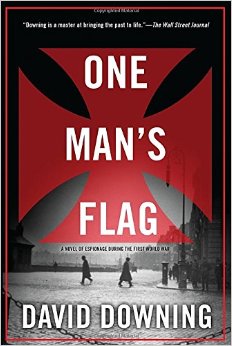

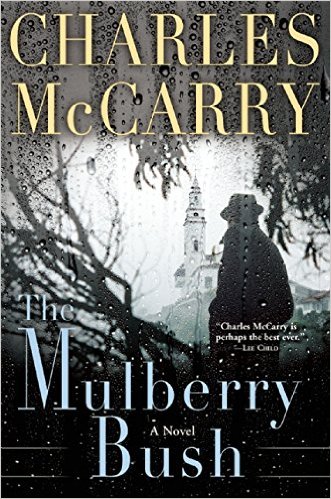

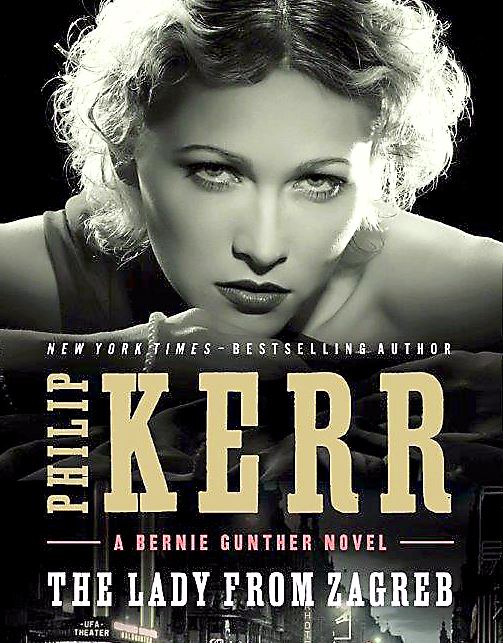
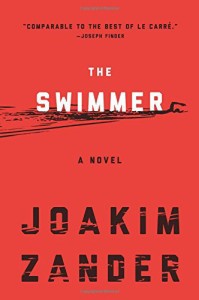
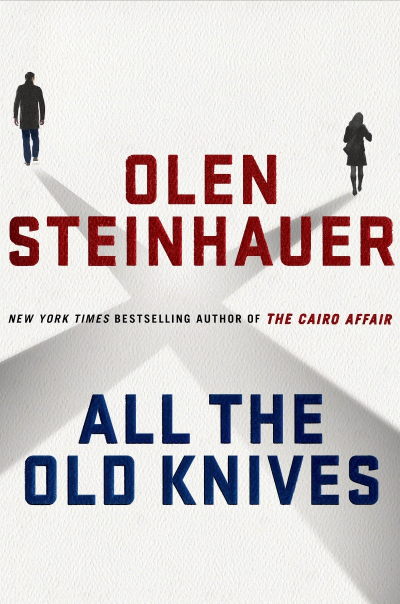
0 Comments
2 Pingbacks